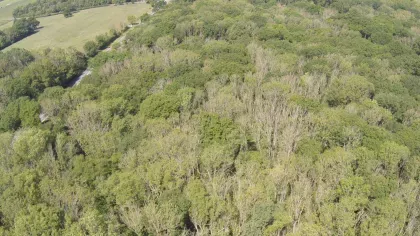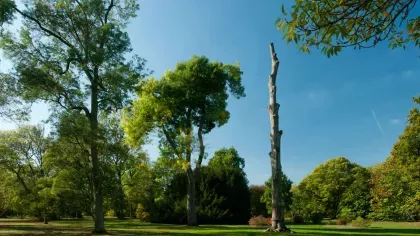Genomic resources for healthy ash trees
Finding genes in ash trees to overcome ash dieback and the emerald ash borer.

Ashes are the third most common trees in the British landscape, but millions are now affected by the fungus causing ash dieback. An even bigger threat, the emerald ash borer, is found in Asia and North America. We are analysing ash genomes to find genes to overcome these threats. We are preserving native genetic variation of UK ash in our Millennium Seed Bank.
The world needs ash trees that are resilient to both ash dieback and the emerald ash borer. We are seeking DNA variants that can provide this, by analysing the genomes of ash trees from Britain and around the world. With our collaborators we have sequenced the genome of a British ash species (Fraxinus excelsior) and of thirty-two other species of ash. Many of these species are present in the living collections at Kew. Some of them come from the native ranges of the ash dieback fungus and the emerald ash borer in Asia, and seem to be resistant or tolerant of them. We are applying evolutionary analysis methods to identify candidate genes that could be used in breeding programmes to develop British ash trees with resistance to both threats. We are investigating the extent to which hybridisation among ash species is possible.
We are also analysing the genomes of British ash trees that seem to have low susceptibility to ash dieback. These are found in large trials set up by Forest Research in the south east of England in 2012. We are applying genome-wide association study and genomic prediction methods with the aim of accelerating breeding of healthy trees.
We need to conserve the genomic variation present in British ash before mortality caused by ash dieback. Kew's Millennium Seed Bank holds large collections of ash seeds made through the UK National Tree Seed Project. This archive of genomic resources may be used to support future breeding or restoration programmes.
Objectives
- Produce draft genome sequences of ash species from around the world.
- Identify candidate genes for resistance to ash dieback and emerald ash borer.
Department
Project Leader
Postdoctoral researcher
- A workable plan for the future development of healthy UK ash populations.
- A comprehensive seed archive of ash genomic variation in UK populations.
UK
- Queen Mary University of London
- Forest Research
- Forestry Commission Scotland
- University of York
- Earlham Institute (formerly The Genome Analysis Centre)
International
- United States Department of Agriculture Forest Service
- Teagasc – Agriculture and Food Development Agency, Ireland
- BBSRC
- Defra
- ESRC
- Forestry Commission
- NERC
- Scottish Government
- Players of the People’s Postcode Lottery
Sollars, E.S.A., Harper, A.L., Kelly, L.J., Sambles, C.M., Ramirez-Gonzalez, R.H., Swarbreck, D., Kaithakottil, G., Cooper, E.D., Uauy, C., Havlickova, L., Worswick, G., Studholme, D.J., Zohren, J., Salmon, D.L., Clavijo, B.J., Li, Y., He, Z., Fellgett, A., McKinney, L.V., Nielsen, L.R., Douglas, G.C., Kjær, E.D., Downie, J.A., Boshier, D., Lee, S., Clark, J., Grant, M., Bancroft, I., Caccamo, M. & Buggs, R.J.A. (2017)
Genome sequence and genetic diversity of European ash trees
Nature 541: 212–216
Harper, A.L., McKinney, L.V., Nielsen, L.R.,Havlickova, L., Li, Y., Trick, M., Fraser, F., Wang, L., Fellgett, A., Sollars, E.S.A., Janacek, S.H., Downie, J.A., Buggs, R.J.A., Kjær E.D. & Bancroft, I. (2016)
Molecular markers for tolerance of European ash (Fraxinus excelsior) to dieback disease identified using Associative Transcriptomics
Scientific Reports 6, Article number: 19335



